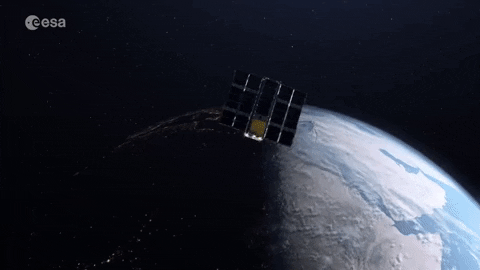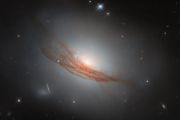
Copernical Team
Teach an Earth-observing satellite to know what it sees

For decades now Earth observation satellites have been monitoring our ever-changing home planet; the next step is to enable them to recognise what they see. The latest public challenge for the machine learning community from ESA’s Advanced Concepts Team is to train satellite software to identify features within the images it acquires – with the winning team getting the unique opportunity to load their solution to ESA's OPS-SAT nanosatellite and test it in orbit.
The chaotic early phase of the solar system
 Before the Earth and other planets formed, the young sun was still surrounded by cosmic gas and dust. Over the millennia, rock fragments of various sizes formed from the dust. Many of these became building blocks for the later planets. Others did not become part of a planet and still orbit the sun today, for example as asteroids in the asteroid belt.
Researchers from ETH Zurich and the N
Before the Earth and other planets formed, the young sun was still surrounded by cosmic gas and dust. Over the millennia, rock fragments of various sizes formed from the dust. Many of these became building blocks for the later planets. Others did not become part of a planet and still orbit the sun today, for example as asteroids in the asteroid belt.
Researchers from ETH Zurich and the N Webb Nearly Set to Explore the Solar System
 As NASA's James Webb Space Telescope moves through the final phases of commissioning its science instruments, we have also begun working on technical operations of the observatory. While the telescope moves through space, it will constantly find distant stars and galaxies and point at them with extreme precision to acquire images and spectra. However, we also plan to observe planets and their sa
As NASA's James Webb Space Telescope moves through the final phases of commissioning its science instruments, we have also begun working on technical operations of the observatory. While the telescope moves through space, it will constantly find distant stars and galaxies and point at them with extreme precision to acquire images and spectra. However, we also plan to observe planets and their sa Astronomers find hidden trove of massive black holes
 A team led by researchers at the University of North Carolina at Chapel Hill has found a previously overlooked treasure trove of massive black holes in dwarf galaxies. The newly discovered black holes offer a glimpse into the life story of the supermassive black hole at the center of our own Milky Way galaxy.
As a giant spiral galaxy, the Milky Way is believed to have been built up from me
A team led by researchers at the University of North Carolina at Chapel Hill has found a previously overlooked treasure trove of massive black holes in dwarf galaxies. The newly discovered black holes offer a glimpse into the life story of the supermassive black hole at the center of our own Milky Way galaxy.
As a giant spiral galaxy, the Milky Way is believed to have been built up from me AI reveals unsuspected math underlying search for exoplanets
 Artificial intelligence (AI) algorithms trained on real astronomical observations now outperform astronomers in sifting through massive amounts of data to find new exploding stars, identify new types of galaxies and detect the mergers of massive stars, accelerating the rate of new discovery in the world's oldest science.
But AI, also called machine learning, can reveal something deeper, Un
Artificial intelligence (AI) algorithms trained on real astronomical observations now outperform astronomers in sifting through massive amounts of data to find new exploding stars, identify new types of galaxies and detect the mergers of massive stars, accelerating the rate of new discovery in the world's oldest science.
But AI, also called machine learning, can reveal something deeper, Un President Biden: NASA to Welcome Japanese Astronaut Aboard Gateway
 President Joe Biden and Japanese Prime Minister Fumio Kishida met in Tokyo Monday where they announced progress on collaboration for human and robotic lunar missions. They confirmed their commitment to include a Japanese astronaut aboard the lunar Gateway outpost and their shared ambition to see a future Japanese astronaut land on the Moon as part of NASA's Artemis program.
"In recent year
President Joe Biden and Japanese Prime Minister Fumio Kishida met in Tokyo Monday where they announced progress on collaboration for human and robotic lunar missions. They confirmed their commitment to include a Japanese astronaut aboard the lunar Gateway outpost and their shared ambition to see a future Japanese astronaut land on the Moon as part of NASA's Artemis program.
"In recent year Researchers start planting space-bred seeds returned by Shenzhou-13
 Chinese researchers have commenced breeding experiments on 12,000 seeds that were bred inside the Shenzhou-13 crewed spaceship in space for six months.
The seeds, including alfalfa, oats and fungi, were selected by multiple research institutions last year. They were brought back to Earth by the Shenzhou-13 on April 16.
Space breeding refers to the process of exposing seeds to cosmic
Chinese researchers have commenced breeding experiments on 12,000 seeds that were bred inside the Shenzhou-13 crewed spaceship in space for six months.
The seeds, including alfalfa, oats and fungi, were selected by multiple research institutions last year. They were brought back to Earth by the Shenzhou-13 on April 16.
Space breeding refers to the process of exposing seeds to cosmic Benchmark Space Systems to support Space Forge's Sustainable In-Space Manufacturing Mission
 With a new major propulsion contract signed to support Space Forge's in-space manufacturing mission, Benchmark Space Systems has announced it has opened a manufacturing and testing facility Northwest of London to build a regional team and its Starling and Halcyon propulsion systems to help empower the flourishing European space sector.
The agreement brings together two of the fastest growi
With a new major propulsion contract signed to support Space Forge's in-space manufacturing mission, Benchmark Space Systems has announced it has opened a manufacturing and testing facility Northwest of London to build a regional team and its Starling and Halcyon propulsion systems to help empower the flourishing European space sector.
The agreement brings together two of the fastest growi Polar Ice and Snow monitoring mission CRISTAL on track
 The Copernicus Polar Ice and Snow Topography Altimetry mission CRISTAL is clearly on track. Following an intensive review process the European Space Agency ESA has confirmed that the preliminary design of the satellite meets all system requirements.
CRISTAL will carry an advanced multi-frequency altimeter that will measure sea ice thickness and ice sheet elevations - key climate change ind
The Copernicus Polar Ice and Snow Topography Altimetry mission CRISTAL is clearly on track. Following an intensive review process the European Space Agency ESA has confirmed that the preliminary design of the satellite meets all system requirements.
CRISTAL will carry an advanced multi-frequency altimeter that will measure sea ice thickness and ice sheet elevations - key climate change ind Varda Space Industries orders 4th Photon from Rocket Lab for In-Space Manufacturing
 Rocket Lab (Nasdaq: RKLB) and Varda Space Industries, the world's first In-space manufacturing and hypersonic Earth re-entry logistics company, report that Varda will procure a fourth Photon spacecraft. The deal follows on a previous bulk-order by Varda in August 2021 for three Photon spacecraft from Rocket Lab.
The Rocket Lab-designed and built Photon spacecraft will provide power, commun
Rocket Lab (Nasdaq: RKLB) and Varda Space Industries, the world's first In-space manufacturing and hypersonic Earth re-entry logistics company, report that Varda will procure a fourth Photon spacecraft. The deal follows on a previous bulk-order by Varda in August 2021 for three Photon spacecraft from Rocket Lab.
The Rocket Lab-designed and built Photon spacecraft will provide power, commun 































